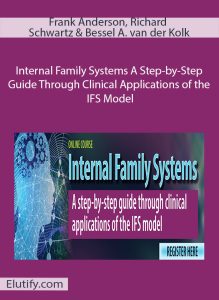Frank Anderson, Richard Schwartz & Bessel A. van der Kolk – Internal Family Systems: A Step-by-Step Guide Through Clinical Applications of the IFS Model

Frank Anderson, Richard Schwartz & Bessel A. van der Kolk – Internal Family Systems: A Step-by-Step Guide Through Clinical Applications of the IFS Model
📄 Click here to view the full course details on the official sales page
(Includes complete description, key features, and official curriculum from the course creator.)
Product Overview (by Elutify):
Unlocking the Power of Internal Family Systems in Clinical Practice
The field of psychotherapy has witnessed countless approaches to healing trauma, but few have had the impact of Internal Family Systems (IFS). Developed by Dr. Richard Schwartz, IFS introduces the concept that every individual is made up of multiple “parts,” each with its own voice, role, and intention. This groundbreaking perspective has revolutionized trauma therapy, helping clients integrate fragmented aspects of themselves and reconnect with their innate capacity for healing.
In the comprehensive program Internal Family Systems: A Step-by-Step Guide Through Clinical Applications of the IFS Model, leading experts Frank Anderson, Richard Schwartz, and Bessel A. van der Kolk come together to provide an in-depth exploration of IFS and its role in trauma-informed care. This long-form training is designed for therapists, psychologists, psychiatrists, social workers, and practitioners who want to transform the way they approach mental health and healing.
Why Internal Family Systems is Transformative
At its core, IFS asserts that the mind is naturally multiple. Instead of labeling this multiplicity as dysfunctional, IFS sees it as normal—and potentially a source of resilience. The challenge arises when trauma forces some parts of the system into extreme roles, leading to inner conflict, shame, anxiety, depression, or self-sabotage.
The genius of IFS lies in its recognition of the Self—a compassionate, wise inner core that exists in every individual. When accessed, the Self can lead the entire internal system toward integration and wholeness. With support from skilled clinicians, clients can shift from living in protective survival modes to experiencing genuine healing and growth.
Richard Schwartz provides the foundational IFS framework, while Frank Anderson, a psychiatrist specializing in trauma and neuroscience, bridges the model with the latest scientific findings. Bessel van der Kolk, one of the most respected trauma researchers in the world and author of The Body Keeps the Score, adds essential insight into how trauma imprints itself on both body and mind.
Together, they offer not only theory but also practical applications that clinicians can implement immediately in their practices.
What You’ll Gain from This Program
The Internal Family Systems: Step-by-Step Clinical Applications program equips professionals with a comprehensive toolkit for using IFS in therapy.
1. Foundations of IFS and Parts Work
-
Understanding the roles of Exiles, Managers, and Firefighters
-
Differentiating between protective parts and wounded parts
-
Recognizing the central role of the Self in guiding healing
2. Trauma and the Nervous System
-
Insights from Bessel van der Kolk on how trauma reshapes brain and body responses
-
The ways trauma fragments the inner system
-
Using IFS to create safety, calm the nervous system, and restore balance
3. Step-by-Step Clinical Applications
-
Practical methods for engaging protective parts without resistance
-
Stepwise approaches to working with trauma survivors
-
Case studies demonstrating how to unburden parts carrying deep trauma
4. Advanced Therapeutic Strategies
-
Integrating IFS with somatic practices and body-based healing
-
Using IFS for dissociation, PTSD, and attachment wounds
-
How to combine IFS with other modalities such as EMDR or CBT
5. Real Case Demonstrations
-
Guided therapy demonstrations by Anderson, Schwartz, and van der Kolk
-
Exercises to practice immediately with clients
-
Practical strategies to help clients feel safe while exploring inner parts
Why This Course Stands Out
Unlike other generic psychotherapy trainings, this course combines theoretical grounding with live demonstrations and practical guidance. The collaboration between Anderson, Schwartz, and van der Kolk is particularly powerful:
-
Richard Schwartz explains the foundational model with clarity.
-
Frank Anderson connects IFS with brain science and clinical psychiatry.
-
Bessel van der Kolk provides insight into trauma research and somatic healing.
This combination ensures that practitioners not only understand IFS intellectually but also know how to apply it effectively with clients.
Who Will Benefit Most
This training is designed for a wide range of professionals:
-
Licensed therapists and counselors
-
Psychologists and psychiatrists
-
Social workers and case managers
-
Trauma-informed coaches and practitioners
-
Healthcare providers working with mental health
Whether you are just beginning your journey with IFS or are an experienced practitioner seeking advanced techniques, this program offers tools to elevate your clinical work.
Outcomes of the Training
Upon completing this program, you will:
-
Confidently guide clients through IFS-based therapy
-
Help clients access the Self as a source of healing
-
Work more effectively with trauma survivors, even in complex cases
-
Address symptoms of PTSD, anxiety, depression, and dissociation
-
Integrate IFS into your broader therapeutic toolkit
The ultimate goal is not simply symptom reduction but deep transformation, where clients learn to relate to their inner world with compassion and leadership.
Why Internal Family Systems is More Relevant Than Ever
Modern research has confirmed what clinicians observe daily: trauma is not just a story of the past, but a lived experience carried in both the body and mind. Traditional talk therapy often fails to address the fragmented nature of trauma responses. IFS offers a structured, evidence-based way to help clients reconnect with themselves and find freedom from internal conflict.
As mental health awareness grows, approaches like IFS that emphasize self-leadership, compassion, and integration are becoming increasingly vital. With guidance from Anderson, Schwartz, and van der Kolk, therapists can help their clients move beyond survival into resilience, authenticity, and healing.
More Premium Courses





